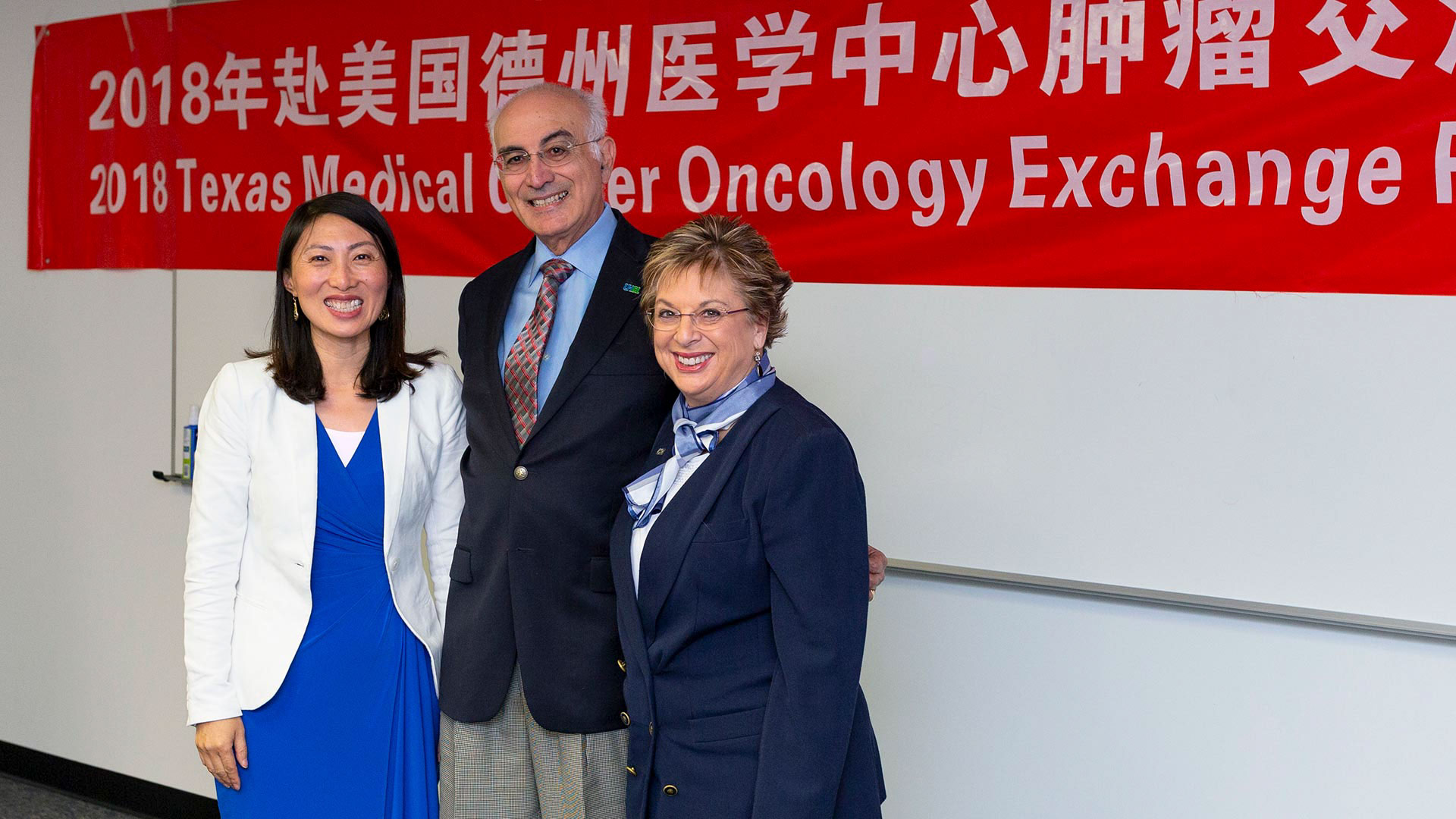Medical professionals collaborate with UHCL to improve Chinese healthcare system
November 22, 2018 | UHCL Staff

University of Houston-Clear Lake’s Department of Healthcare Administration’s prime
location at the Texas Medical Center made it the optimal setting for a visit last
summer from Chinese healthcare executives seeking an opportunity to learn more about
the American health care system to help improve their own. It was such a successful
visit that with the help of Wei Wu, executive director of the U.S.-China Center for
Medical Exchange, another group of 20 Chinese oncologists plans to arrive in November,
said Faculty Chair and Lecturer Raymond Khoury, who also serves as executive-in-residence
for the Healthcare Administration department.
“Our classes are in the Medical Center, which is the largest center of health care
delivery and research in the world,” Khoury said. “With the help of interpreters,
the Chinese healthcare executives attended some of my lectures and we discussed aspects
of our health care system. They had many questions about financing and management.
They also wished to learn about clinical things in the hospitals and observe how we
conduct patient care.”
The Center for Executive Education for the College of Business at UH-Clear Lake serves
as the link between the university, local businesses, and the community and offers
numerous outreach programs. “We are developing several healthcare programs in the
Texas Medical Center area and beyond,” said Jo Anne Laborde, business development
officer for CEE. “With the help of our healthcare administration faculty, we make
programs available to the healthcare community. When Dr. Wu contacted us, we saw it
as another creative way to use CEE to reach out.”
The U.S.-China Center for Medical Exchange’s mission is to foster exchange and cooperation
between the U.S. and China in the areas of medicine and health care. Wu searched for
an educational institution in Houston that could provide the opportunity for Chinese
health care executives to come to the U.S. to learn more about the health care system.
She found an article about University of Houston-Clear Lake’s Center for Executive
Education and the Healthcare Administration/Business Administration degree. That led
her to contact Laborde. “The Center works closely with healthcare entities to provide
programs to healthcare practitioners with the goal of improving their leadership and
management skills for the business of healthcare,” Laborde said.
“UH-Clear Lake has very good programs. That’s why this summer we brought doctors from
China to visit the Texas Medical Center and come to Prof. Khoury’s lecture about health
care administration,” said Wu. “Their objective is to come to the U.S. and to learn
how the American healthcare system works.”
Wu explained that with China’s large aging population, there are increasing needs
for the country’s health care system to make changes to improve its care. “In 2015,
Chinese Vice Premier Liu Yandong visited the Texas Medical Center and thought very
highly of it. She returned to China and asked health care leaders to visit the Texas
Medical Center to learn its unique characteristics”
“Chinese doctors have been visiting American and European hospitals for years learning
about management,” Wu said. “The American and European health care systems are considered
more advanced in terms of medical outcomes. The hope is to learn more management skills
and find ways to improve the Chinese healthcare system.”
There are many differences between the systems, beginning with how doctors are trained.
“In China, a student will go to medical school after high school ,” Wu said. “Their
residency program is relatively new. The government provides healthcare to everyone,
and the best hospitals are owned by the government. Doctors do not prefer working
in private practice. Most work in hospitals.”
She added that unlike the U.S., China has recently begun to develop the primary care
specialty. Doctors all have a specialty, she said, and patients generally go to the
hospital even if they just have a cold.
Chinese doctors, Wu continued, can spend only a few minutes per patient, as they often
treat up to 80 patients a day. “Traditionally, patients don’t make appointments to
see a doctor in China. They go to the hospital and line up,” she said. “If you are
too sick to wait in a line, you get a family member to take your number and wait for
you. When it’s your time, you come in.”
As a result of their first visit to the Texas Medical Center, Wu said, the Chinese
doctors learned more about the culture of patient care. “Hospitals in the U.S. look
like hotels and they try to reduce that ‘hospital feeling.’ They also offer spiritual
care and care more for the total person, not just the disease. Doctors have made many
comments about this. And they have new ideas about hospital management from Prof.
Khoury,” she said. “Chinese hospital executives appreciate the opportunity to learn
from Prof. Khoury since he has real experience as CEO of hospitals.”
Wu said many Chinese patients come to the Texas Medical Center for treatment. “That
is also why many Chinese healthcare leaders come to Houston,” she said. “But American
healthcare leaders don’t know much about the Chinese healthcare system. That’s why
I encourage American doctors should go to China to learn more about the system there
as well, because there is a lot of efficiency in the system due to the large population,
and costs are low. There is benefit for both sides,” she said.
For more information about UHCL’s Center for Executive Education, visit www.uhcl.edu/center-executive-education.
For more information about UHCL’s master’s in healthcare administration, visit www.uhcl.edu/academics/degrees/healthcare-administration-mha.
About the Author:
Recent entries by
October 18 2022
Better technology transforms campus safety: Police Chief demonstrates SafeZone to students
October 14 2022
Student's skill with drones takes chicken turtle research to new heights
October 11 2022
Planting event to help UHCL restore native plants to campus, support environmental sustainability







